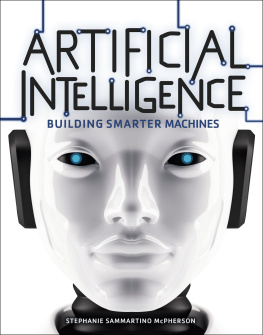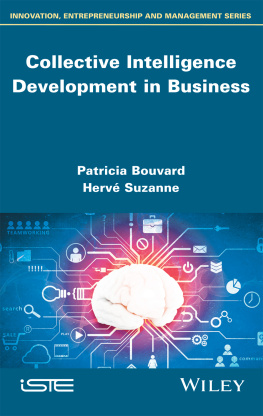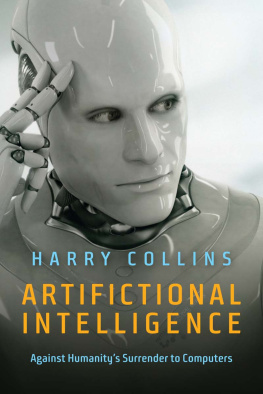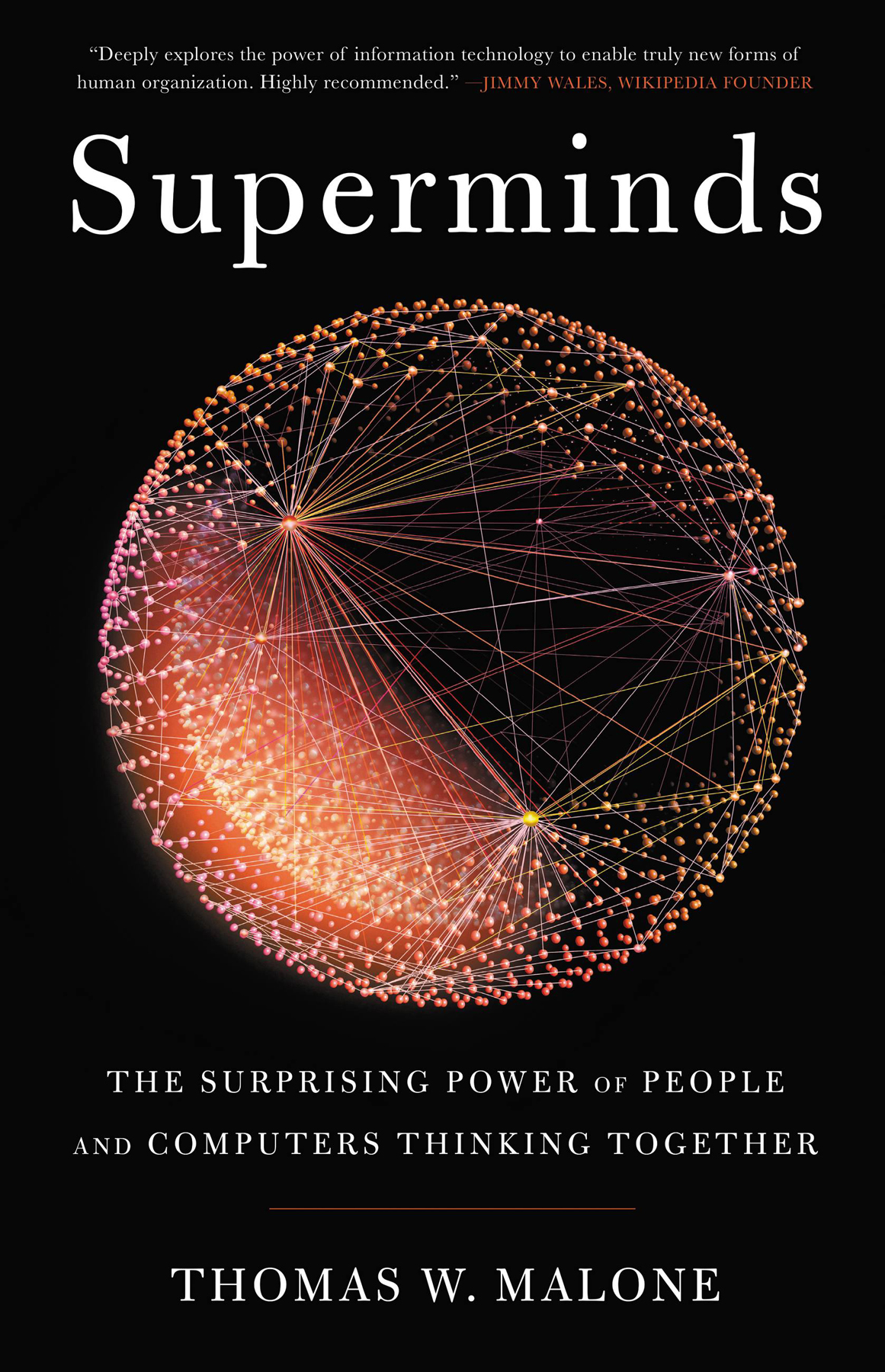Thank you for buying this ebook, published by HachetteDigital.
To receive special offers, bonus content, and news about ourlatest ebooks and apps, sign up for our newsletters.
Copyright 2018 by Thomas W. Malone
Cover design by Oliver Munday
Cover art by Mina De La O / Getty Images
Cover copyright 2018 by Hachette Book Group, Inc.
Hachette Book Group supports the right to free expression and the value of copyright. The purpose of copyright is to encourage writers and artists to produce the creative works that enrich our culture.
The scanning, uploading, and distribution of this book without permission is a theft of the authors intellectual property. If you would like permission to use material from the book (other than for review purposes), please contact permissions@hbgusa.com. Thank you for your support of the authors rights.
Little, Brown and Company
Hachette Book Group
1290 Avenue of the Americas, New York, NY 10104
littlebrown.com
First ebook edition: May 2018
Little, Brown and Company is a division of Hachette Book Group, Inc. The Little, Brown name and logo are trademarks of Hachette Book Group, Inc.
The publisher is not responsible for websites (or their content) that are not owned by the publisher.
The Hachette Speakers Bureau provides a wide range of authors for speaking events. To find out more, go to hachettespeakersbureau.com or call (866) 376-6591.
All image credits appear in the endnotes.
ISBN 978-0-316-34910-9
E3-20180410-JV-PC
Praise for
Superminds
Superminds is the first book I have seen that deeply explores the power of information technology to enable truly new forms of human organization. I really love the premise and thoughtfulness of the book, and I highly recommend it if you want to understand and make sense of what we are likely to see in the next few years!
Jimmy Wales, Wikipedia founder
From the father of collective intelligence, a refreshingly realistic view of how computers will supercharge collective intelligence and how these superminds can help us tackle the most complex problems that face the world today.
Joi Ito, director of the MIT Media Lab
Thomas Malone was a decade ahead of most of the rest of us in thinking about the future of work. Nowin this fascinating bookhe has done it again, looking ahead to a hyperconnected world and introducing us to new vistas of human capability and creativity achievable through collective intelligence. By thinking imaginatively about our future, Malone helps us think differently about the present.
Anne-Marie Slaughter, CEO of New America and author of Unfinished Business
Tom Malone puts worries about artificial intelligence in perspective, explaining why AI works best when combined with humans in superminds. What makes a supermind more or less intelligent is just one of many surprises in this fascinating book.
Patrick Winston, former director of the MIT Artificial Intelligence Laboratory and author of Artificial Intelligence
As Tom Malone observes, its usually harder to create the future than to imagine it, but in the case of interacting, networked people (as with Facebook), sometimes its the other way around. The wonderful essence of Toms book is to imagine how people and computers will interact on a massive scale to create intelligent systems. And by imagining them in advance, we have some hope of nudging them in a positive direction.
Esther Dyson, executive founder of Way to Wellville and author of Release 2.1
After helping introduce the phrase future of work in his 2004 book with that name, Tom Malone is back to remind us that the real impact of technology will come not only from AI but also from harnessing human minds at hyperscale. In this terrific, well-researched, and highly readable book, he explores provocatively and practically the opportunities and challenges that superminds will help us address in businesses and society. Leaders who care about harnessing the power of human minds in a world enabled by digital technologies must read this book.
James Manyika, chairman of the McKinsey Global Institute
Humans plus computers and networks have enormous potential. How can such wee creatures as ourselves take advantage of this potential? In his new book, Malone addresses this question in a concrete way, laying the foundation for a new discipline: the systems engineering of superminds.
Vernor Vinge, Hugo Awardwinning science fiction author and originator of the technological singularity concept
Malone takes us on an intentional journey into thinking about thought, intelligence, reasoning, and consciousness. He sees these notions in extremely broad terms that have changed my views of what it means to thinka property that emerges from aggregations and organized structures. I may never see a four-legged table the same way again!
Vint Cerf, vice president at Google and one of the fathers of the Internet
A remarkable journey into the basic structuresmarkets, hierarchies, democracies, and morethat have advanced civilization throughout history and now bring us to a turning point where the complex problems facing humanity can be addressed by people and computers working together in totally new ways. A must-read for anyone interested in a fresh look at artificial intelligence.
Amy Edmondson, professor at Harvard Business School and author of Building the Future
To my parents, Ernest and Virginia Malone
Supermind is an English word that means a powerful combination of many individual minds. This book is the story of superminds on our planet. Well see that the history of humanity is largely the history of human superminds, of how humans in groupslike hierarchies, communities, markets, and democraciesaccomplished things that individual humans could never have done alone.
More important, well see how crucial computers will be for the superminds in our future. For a long time, the most important contribution of computers wont be artificial intelligence; it will be hyperconnectivityconnecting human minds to each other in new ways and at unprecedented scales. But over time, computers will also do more and more of the complex kinds of thinking that only humans do today.
This book is not primarily about how computers will do things people used to do. Its about how people and computers together will do things that were never possible before. Its about how human-computer superminds will be smarter than anything our world has ever seen. And its about how we can use these new kinds of collective intelligence to help solve some of our most important problems in business, government, and many other parts of society.
I n January 2009, Tim Gowers posted a blog entry that would make history. Gowers is a mathematics professor at Cambridge University, and he proves mathematical theorems for a living. If youre like most people, you probably havent proved a theorem in your life, or at least not since high school geometry class. But the rigorous, logical thinking that is captured in mathematical proofs is at the heart of many of humanitys most important scientific and technological achievements.
Usually, proving theorems requires hours of solitary work, trying to figure out how to do just one piece of one subpart of a complex proof. In 2009, Gowers decided to try a different way of doing things. He wanted to see if a large group of people on the Internet could prove a theorem together.






